Spring Day: A Conclusion
Whenever I take a look at theories about Spring Day, they usually never correlate to the Most Beautiful Moment in Life at all — in fact, many will say that Spring Day actually is an outlier and seems to depict around a story separate to the Most Beautiful Moment in Life series.
But what do I see it as? A conclusion.
The closure and cessation of their story — their youth. I interpreted Spring Day as a end, a mere settlement. In Spring Day, we find that the song characterizes many subjects: loss, maturity, and simply growing up; relatable subjects that were addressed within Most Beautiful Moment in Life series.
As I said before, I see Spring Day as a conclusion. The final closure to their youth their adolescence and pure juvenesence. In my eyes, this as an adieu to the concept of youth — once again, in a sincere and ravishing way.
Spring Day takes place in the times of a polar winter. The visuals given in the MV seems to exhibit a story of apprehension and stimulating angst, also with the constant reminder of abandonment and loneliness. Once again, Bangtan is promoting youth.

The MV shows the visuals of snow and frigid weather a multitudinous amount of times, but the song is actually talking about spring. I'm sure you already knew that, with the track name being Spring Day, but I'm sure you were irked because of the repetitive references towards winter throughout the MV.
"Past the end of this cold winter
Until the spring comes again
Until the flowers bloom again
Stay there a little longer
Stay there"
—trans cr; pop!gasa
I believe the Spring references have a deeper meaning: not just as a season, but as a new beginning. When Spring arrives, the scenery and terrain seems to alter, and begin to grow; to fill with new life. This really supports my interpretation of Spring Day being a conclusion — the concept of youth, which has been preloved by Bangtan, seems to be coming to an end.
Of course, they decide to add a snippet of vague scholarly citations towards the storyline of Spring Day. I'm nowhere near surprised to see that Bangtan has once again stumped us with their obscure references towards literature such as "The Ones Who Walk Away From Omelas" and previously "Demian" from the WINGS era.

In the Spring Day MV, the Omelas Hotel is often referenced to the short story, "The Ones Who Walk Away From Omelas".
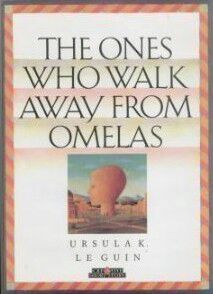
It's a short story that revolves around a utopia where everybody is happy. However, there's a terrible, and corrosive secret that the city holds; a secret that every citizen tries to avoid.
To sustain the "happiness", a child has to sacrificed by living in a locked basement cell with a small amount of food and no windows/doors. That poor, innocent, and sacrificed child is having to live in such misery while everybody else is beaming with happiness in Omelas.
"If the child were brought up into the sunlight out of the vile place, if it were cleaned and fed and comforted, that would be a good thing indeed; but if it were done, in that day and hour all the prosperity and beauty and delight of Omelas would wither and be destroyed."
In the story, some curious adolescents choose to walk away from the false utopia to the new journey ahead of them — to strive and move forward — to finally close their youth and actually grow up.
I believe the correlation of Omelas and the hotel could be an essence of being wistful and awfully sentimental. The paradise in which they believed in for so many years to maintain their happiness and youth; finally, they realize that they must move on towards the uncertainty and adventure awaiting them.
That says and promotes that even the most beautiful moments in life eventually burn out — never do they last forever.
Jungkook is the one to board the train from Omelas first.

In many theories, he’s said to be the one who most unwilling to mature. He must be afraid of what the future and the journey ahead of him. He's the one who has had a hard time adjusting to reality and the one who didn't want to move forward.
Followed by Rap Monster, who runs back to the hotel, I feel like his visit to the hotel was solely to grab the rest of the members (I guess that's what a leader does, eh? Eh?), but I guess that can also resemble the hardships of running towards the future without the memories of the past.

In the end, Jungkook runs back to get his fellow bandmates.
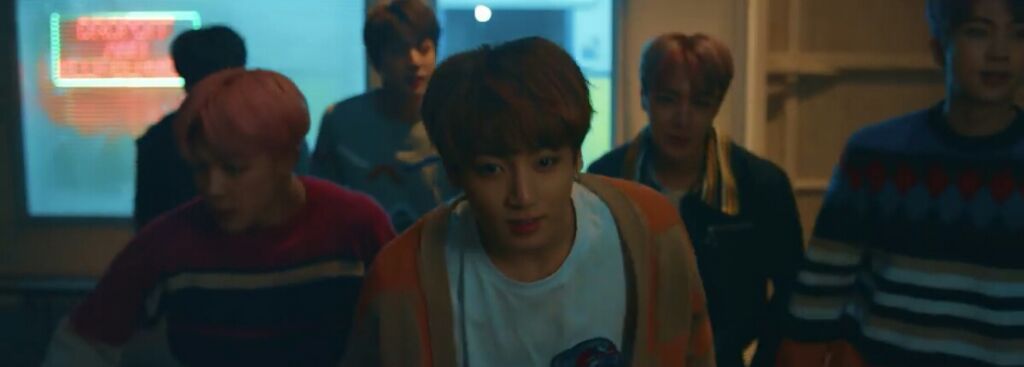
The rest of the members board the train. However, Suga is lost (literally) in a mountainous pile of laundry which can be a metaphor for memories that he seems to be clinging onto.

In the MV, whenever he does appear, he is found on the pile of laundry and raps (angrily & quite emotionally) about a person who left him.
Jimin is a very, very interesting character within the story.
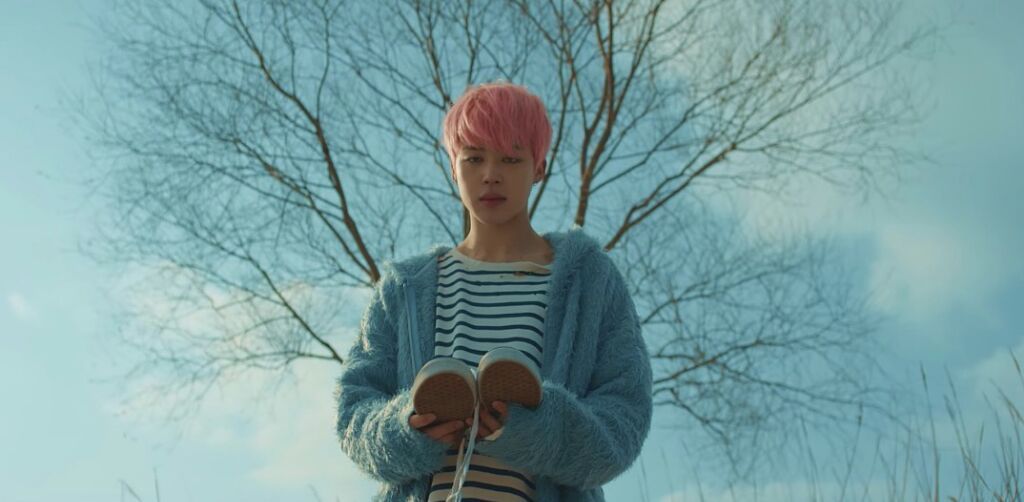
His plot in Spring Day is characterized with shoes. Shoes seem to be a metaphor for all the burden and lingering memories. He sits alone with the sneakers by the shore as he looks somewhat nostalgic — he does seem to depict an angsty demeanor, and I believe he is trying to shrug away the memories of the past.
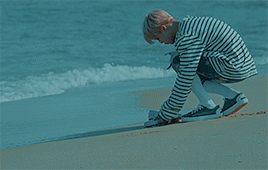
Jimin seems to be the one who isn't ready to move on at all. In fact, during the short scene of Bangtan on the train, he actually pushes away J-hope's soothing hand to his knee as he sits alone with his knees close, snuggled against his chest.
Surprisingly, J-hope and V mature in a very unique way.
In the Most Beautiful Moment in Life series, J-hope had been fighting with the one significant problem: heights. In Spring Day, the visuals can declare that he has defeated the problem, and fear — he had overcome what he thought couldn't be repaired.
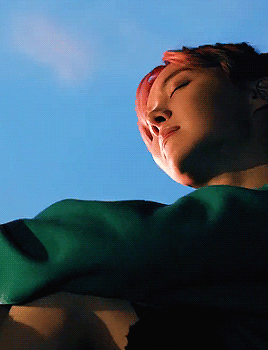
V is yet again one of the most interesting characters within the story--previously, he was fighting with angsty suicidal and family issues. It seems, just like J-hope, he has grown up, and defeated the illnesses and disorders: he was able to push those all away — he is found smiling and seems to be excited to board the train to the new world.

Something I can definitely get out of this MV is that there is no such thing as genuine happiness in the city of Omelas. Even in the fictional short story, Omelas, there was never true happiness — they had to sacrifice an innocent child to keep the balance of "happiness".
I suppose that when Bangtan became fully aware of the issue and took further action that being "forever young" does not bring the happiness that Omelas is said to give, so they board the train.

They move forward and don't look back — they ditch their youth and decide to grow up. They leave Omelas and begin their journey, leading to a whole entire new concept, and to a new season named Spring.
First Written: 2/10/2017
Originally Posted Here
Comments
Post a Comment